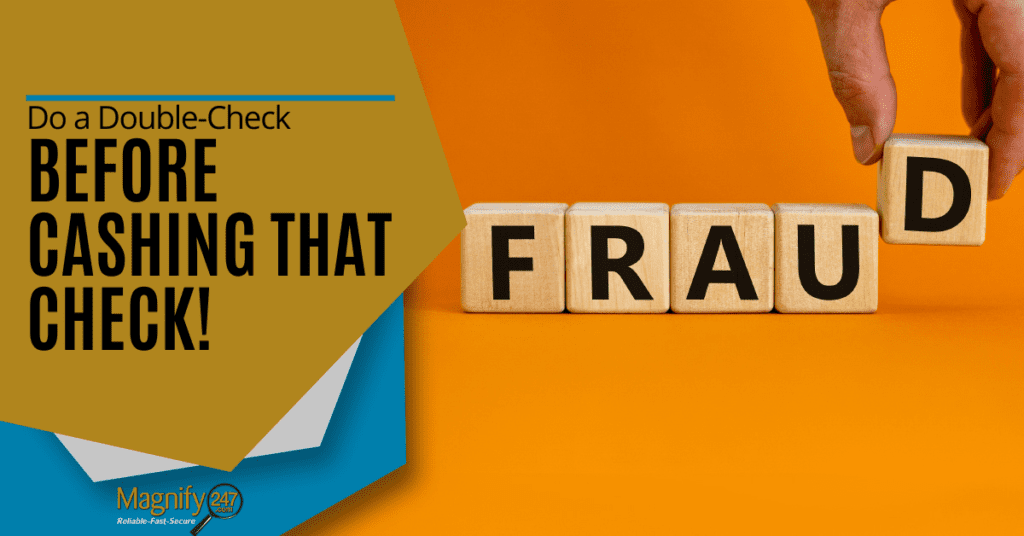There is a lot of hopeful mailbox checking going on this spring. Many people are awaiting a healthy stimulus check from the last round of recovery payments, others are looking for their tax refund to show up.
watch a short video > https://youtu.be/05lTUhe5y0o
While many in Gen Z aren’t even sure how to write a check because they grew up in the age of debit cards and Venmo payments, checks are still a scam that can result in identity theft and incidents that defraud people out of their hard-earned money.
Check frauds are a little different than remote support scams or phishing emails. They’re a little more personal because they involve something tangible, a paper check that shows up in your mailbox.
The disruption and other activities related to the COVID-19 pandemic have provided scammers with new forms of attack and this includes sending fake stimulus checks.
As of January 2020, Americans have been scammed out of nearly $300 million through COVID-19 and stimulus payment fraud.
Take a beat before you rush to the bank when a check finally arrives. Unfortunately, in today’s scam-filled climate, you can’t just assume that a refund or stimulus check is legitimate.
How Do Fake Check Scams Work?
There are a few different ways that scammers perpetrate fraud using paper checks. Right now, there are a lot of government check scams going around because millions of people are expecting these checks, which makes it easier for scammers to get their fakes mistaken for the real thing.
Beyond government checks, there are a few other types of check frauds that people get taken in by any time of year. We’ll discuss both types beginning with the fake tax refund and stimulus check scams.
You might wonder? How can someone scam me out of money by giving me a check?
The fact is that as fast as banks currently process things, they can still be a few days behind in identifying that a check is fake. People usually assume a bank knows immediately and won’t even deposit a check if it’s not legitimate. But that’s not how it usually works. Banks may not know until 2-3 days after you deposit a check that it’s bogus (there are some really good fakes out there!), then once they discover it’s a fake, that money is deducted right out of your bank account.
How the scam works is that once you have deposited the check, the scammer will reach out to you and note that a mistake has been made and there was an overpayment to you on that check. You’ll be asked to return the money, typically by wiring it to a specific account.
If you received $5,500 and were told you were only supposed to receive $4,500, you may not think twice about returning the extra $1,000 that’s sitting in your bank account. But you are being scammed out of that thousand dollars, because as soon as the bank identifies the fraud, that $5,500 will be deducted.
How Can You Identify a Real Government Check?
There are a few different markers that can help you identify the real thing when it comes to a U.S. Treasury check:
- Treasury seal
- Bleeding ink
- Microprinting
- Watermark
- Ultraviolet overprinting
See what each of those elements looks like here.
Other Types of Check Scams
Most check scams will work in the same way. You’re provided with a check and you deposit that check thinking it’s legitimate. Then you’ll be contacted by the scammer about an “overpayment” and will be asked to transfer your (very real) money to the scammer in the amount of that overpayment.
Then, the bank discovers the check is a fraud and deducts those funds from your account.
Here are a couple of ways that this scenario can play out.
The Unknown Shipping Company Scam
Someone contacts you wanting to order your products and asks to use their own shipping company to ship their goods. This usually involves something that will cost $1,000 or more to ship, such as an overseas shipment of a pallet of items.
They’re placing a nice size order, so you don’t see any reason not to ship through their company.
They ask that you invoice them for the shipping along with the product, and they’ll pay you for both, but YOU will be paying the shipper directly. The shipper turns out to be a scam and the payment the “buyer” gives you is a scam too.
The Fake Roommate Scam
For kids going off to college or people looking for a roommate, a common scam is for a seemingly great roommate to agree to share the deposit and first month’s rent payment on a new apartment.
They send you a check for the whole thing “by accident” and ask you to wire them the balance (i.e. your half). Again, both the check and the roommate are fakes.
Adopt Good Security Habits, Starting With Your Devices
Magnify247 can help your Hamilton County business and your employees adopt good cybersecurity habits, which improve scam detection for all types of fraud.







